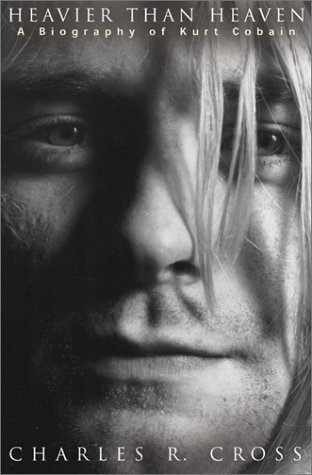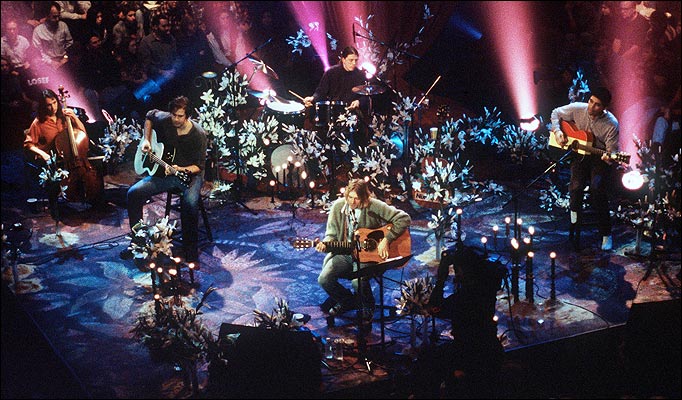THE NIRVANA CONCERT DVD, MTV Unplugged in New York has been in our house for years, but I only just watched it. News flash: It’s fantastic. Why did it take me so long to come around? I wish I could say I’ve been oh so busy, but that’s not the case.
Here’s the thing: Cobain, whom I considered “one of my own,” killed himself four months after the taping, and that made me furious. In the past, several things colored my attitude toward suicide: my dad was a suicidal alcoholic, my best friend took his own life, and I’ve sat at the deathbeds of several people – young, old, and in-between – who would’ve given anything for more time, regardless of their circumstances. And Cobain, whose music I loved, had attained everything I’d once wanted. His choice to put a shotgun in his mouth as a means of coping with his problems, which included fame and fortune, struck me as the height of hateful self-absorption, especially considering he was a new dad. Even though I’ve dealt with depression – or maybe because of it – I reflexively and self-righteously (and cluelessly) raged about suicide.
But when Robin Williams recently hung himself, I found that my feelings on suicide had shifted from rage to something else. To describe it, I lean on Tom Waits, who coined the term razor sadness. (“9th & Hennepin,” from Rain Dogs.) It still hurts, and I still mourn and feel strongly about proactive suicide prevention, but my dominant feeling is a pain that I use to sharpen focus on my existing world. Razor sadness. I welcome it in place of the toxic indignation I once felt. It’s not that I understand or forgive; I don’t, although I try. But when folks go off as I once did, reducing suicide to a “cop-out,” i.e. thinking they “understand,” I cringe.
How my change of heart happened, I can’t say for sure. Perhaps personal rage at suicides is a young man’s game, a young, scared man’s game. These days, such rage feels like nitroglycerine, and my increasingly creaky engine can’t abide that; I need different fuel for the long haul. And razor sadness is good for that. I can work with it. Rage, on the other hand, works me, and corrodes me inside out.
Meanwhile, this has been a big year for Nirvana, so they were already on my mind, even before Williams’ suicide. April 5th marked the 20th anniversary of Kurt’s death, and ten days later, Michael Stipe inducted Nirvana into the Rock and Roll Hall of Fame Class of 2014. I attended the ceremony in Brooklyn, and the most touching moment was when Wendy O’Connor, Cobain’s mother, accepted on her son’s behalf. (Frances Bean, Kurt and Courtney Love’s 21-year-old daughter, was absent.) Beautiful, sad, and poised, Wendy said, “Kurt would have loved this. He would have said he didn’t love it. But he would’ve loved it.” Something in me began to turn.
After months of rumination, I went back to the DVD. (You can watch the whole thing for free below, or here.) While MTV repeatedly broadcast the performance in the months after Cobain’s death, the DVD wasn’t released until 2007, thirteen years later. (I can only guess the delay was due to legal shit, in which Nirvana, a contentious, multi-million dollar industry, remains steeped.) Many considered the performance an elaborate suicide note, the last steps in Cobain’s perverse, public dance with death. In addition to lyrical messages, that dance had included heroin, overdoses, gun lust, and titillating quotes from Cobain that he had “suicide genes.” (He did.) And the 14-song Unplugged setlist is heavy on the self-loathing and death songs, all delivered on a stage decorated to look like a funeral.
Still, whether or not he’d already made up his mind to kill himself is impossible to know, and, frankly, the argument is distracting from the document itself, which, 20 years on, and witnessed through wizened eyes, is a riveting, ragged-but-right hour of genius pop art that deserves to be seen on its own terms. I daresay one could come upon it with no knowledge of the suicide and still recognize its greatness. Quite strangely, it could’ve been filmed yesterday. Nothing about it really screams “nineties.” It’s like Nirvana froze time. In any case, it’s much more than a “goodbye cruel world” note from Kurt Cobain.
For starters, Unplugged is the work of a badass group of musicians who’ve done time in the trenches and achieved a greater-than-the-sum-of-its-parts unity that only comes from hard touring and occasionally scraping one another off floors. Such musicians’ interlaced playing radiates an effortless, beguiling intimacy (even if they hate each other). Bassist-accordionist Krist Novoselic and drummer-bassist-vocalist Dave Grohl (yes, he plays bass and drums simultaneously while singing backup on “Jesus Doesn’t Want Me For a Sunbeam”) and guitarist Pat Smear are vital to this endeavor’s success. (Also, secret weapon cellist Lori Goldston and guesting Meat Puppets Chris and Curt Kirkwood add a lot.)
Punk rock musicians who can play with subtlety are rare. It’s easy to turn it up to 11, masking any discrepancies in technique with volume, distortion, and attitude, and Kurt Cobain in particular was great at that, even though he didn’t need to be. (I’ll go out on a limb and suggest Nirvana preferred the term “punk” over “grunge.”) But here, armed with material they trust, Nirvana holds back, allowing the songs and Cobain’s voice to do more work than usual, starting with “About A Girl” and (the only “hit” of the set) “Come As You Are.” Cobain enunciates, and for once, you can discern (almost) every syllable he sings. His gutter poet lyrics shine. Restraint and punk rock dovetail, an odd occurrence, for sure, and the tunes breathe as never before. (Or again.) Instead of inviting you to surf upon them or use them to rocket you into another space, the band beckons you to get inside the songs, and performs in a way that makes this possible.
True, restraint wasn’t altogether unfamiliar territory for them. Nirvana incorporated restraint in their Pixies-esque soft-loud dynamic (see “Lithium” and “Smells Like Teen Spirit,” among others) but for Unplugged, they take it much further, with no sonic blast as a payoff. The words, grooves, and melodies must bear the songs aloft, and they do. Cobain is not a hot-shit guitar player (“I guarantee you I will screw this song up,” he says before pretty much nailing Bowie’s “The Man Who Sold the World”) but it doesn’t matter; his primal chops, buffeted by his more adept friends, are perfect for the task at hand, which is mainly to deliver the songs and give him bedrock for his astonishing voice.
That said, Nirvana isn’t exactly swaggering in Unplugged. According to Charles Cross’s excellent Cobain biography Heavier Than Heaven, Kurt was more nervous than he’d been at Nirvana’s 1987 debut (at a kegger), which means really terrified. And yet, the unsteadiness works, in part because it gradually falls away, adding to the sense of an arc. Especially at the outset, there’s a feeling of risk in the air, of vulnerability, eyes vigilant beneath furrowed brows. He barely acknowledges it at first, but as applause continues to rain down, Cobain begins to accept it, although he never quite relishes it. He begins the show with a clenched grimace, drug distant, annoyed, but finally, three songs in, he smiles when introducing “official honorary punk rocker” Pat Smear. Later, he looks positively gleeful when a fan objects to him taking too long to get his shit together between “Something In the Way” and the Meat Puppets’ “Plateau.” “Hurry up!” she yells impatiently. This punky outburst evokes a genuine grin, and prompts a funny digression between Kurt and Krist about the creepy vintage Christian cartoon program Davey and Goliath; Kurt’s falsetto impersonation of little boy Davey is spot on. (This is their response to being told to hurry up.) At one point someone brings him a fourth cup of tea, prompting him to bite the hand that feeds. He says, sarcastically, “I only have three cups of tea already…” But he can’t keep up the punk pose, adding, “ …but thank you.”

Crucial to the singular nature of Unplugged is the never-duplicated punk-folk-Addams Family vibe of the setting. According to Heavier Than Heaven, this aesthetic, including Stargazer lilies, a chandelier, and black candles, was mostly Kurt’s vision. Although MTV fought them on everything from décor to song selection to usage of Kurt’s amp (i.e. not-quite-unplugged) to whether or not they’d do an encore, the intimacy of the “unplugged” format was never so genuine and powerful, affording a deep connection to a band not known for “people pleasing.” (Indeed, Heavier Than Heaven also includes the story of Cobain hocking a phlegmy “loogie” on an overly aggressive autograph-seeking fan before an Unplugged rehearsal.)
Also notable is director Beth Miller’s decision to let the show run unedited, in one long take, complete with every bit of between-song patter, discussion, tuning, griping, cigarette-bumming, Skynyrd jamming, and fumbling. The anti-showbiz affect, which I usually find off-putting, combines with moments of transcendence – solo acoustic shouter “Pennyroyal Tea” and hooky lament “Dumb” – to make one potent cocktail.
Rather than lean on the hits that made them famous, Nirvana plays less-popular tunes, deep cuts, giving themselves a chance to be their own A & R men for a change. But just as telling is the band’s insistence on the six covers, including three by and alongside eccentric Meat Puppets brothers Chris and Curt Kirkwood. This choice presents Nirvana as fans, especially Kurt, who gets giddy when the shaggy Kirkwoods lope onstage. Cobain, Grohl and Novoselic aren’t just reluctant rock stars saying, “Lookee what we can do,” but music nuts, for whom records and arcane rock are gospel, and more important than canny business decisions. They’re shaking your arm and saying, “You gotta check this out,” making sure the Vaselines get their shout-out, and Nine Inch Nails get dissed. Who does that? A friend. The loopy melodies of the Meat Puppets songs are challenging for Kurt, quite different from Nirvana fare, but he’s having fun stretching for the notes, singing about the lake of fire where souls go, and how he formulates infinity inside himself.
The most arresting moment of transcendence and song-sharing is certainly Nirvana’s cover of Lead Belly’s arrangement of the 19th century Appalachian ballad “Where Did You Sleep Last Night?” which closes the show, and which may be Kurt Cobain’s finest moment as a singer. After soliciting requests from the audience and the band, he smiles and says, “Fuck you all, this is the last song of the night,” and launches into the haunting, minor key, public domain waltz about an unfaithful girl, a beheaded husband, and a man who demands more than life will give him. He asks again and again, “where did you sleep last night?” and even though the answer is “in the pines, in the pines, where the sun never shines,” he is unsatisfied, and he demands the truth, again and again, finally screaming like the best of the rock screamers, giving it every ounce of his soul, until, blue eyes burning for a timeless instant, he finally surrenders to not knowing.
Watch Nirvana Unplugged In New York – Full performance in Music | View More Free Videos Online at Veoh.com




Ragwater, bitters, and blue ruin….
I’ve never seen that Unplugged show, but hearing its version of Come As You Are on the radio just weeks before he died cinched my Cobain fanship. Even though I’m really a jazz guy.
Good article, Robert.
Thanks, Mon Frere!
Kurt continues reacting to someone saying “hurry up” , by lighting a cig, then he introduces the meat puppets brothers, then he reads an article…..then looks up like….oh y’all are waiting on me?